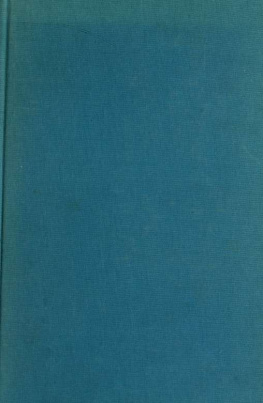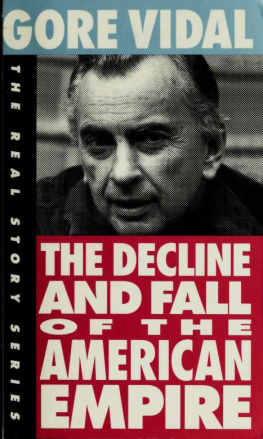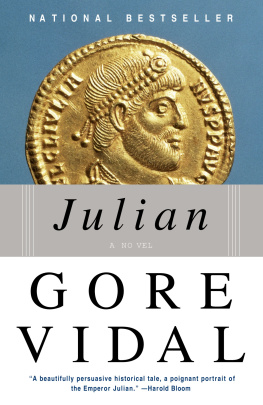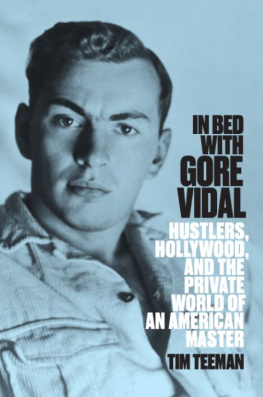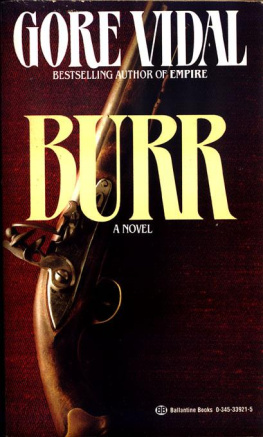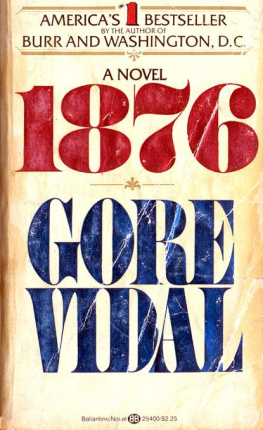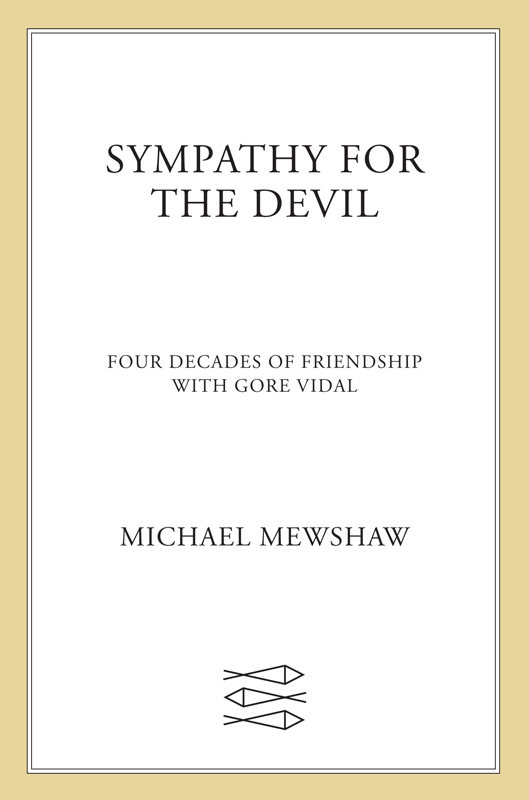Contents
Guide

The author and publisher have provided this e-book to you for your personal use only. You may not make this e-book publicly available in any way. Copyright infringement is against the law. If you believe the copy of this e-book you are reading infringes on the authors copyright, please notify the publisher at: us.macmillanusa.com/piracy.
For Donald and Luisa Stewart
Contents
I spend most of my time in California. I feel I am fueled by rage and by the political climate there. I am angry most of the time when I am there, which might be unbearable for someone else, but for me its fuel for my writing.
Gore Vidal, from an interview late in his life
Despite his aloof and at times forbidding demeanor, Gore Vidal managed to project an image that persuaded millions of people around the world that they knew him on a personal basis. For more than sixty years he remained a bestselling writer, an influential social and political commentator, and an intellectual force whose work had an impact even on those who never read him. The author of judiciously researched historical novels ( Burr , 1876 , Lincoln ) as well as outrageous, genre-defying postmodern texts ( Myra Breckinridge , Myron , Duluth ), he also wrote successful Broadway plays, countless film and television scripts (countless because he was frequently and unfairly denied screen credit), and hundreds of book reviews and essays on subjects ranging from sexual identity to religious fundamentalism, academic charlatanism to American imperialism.
Twice he ran for public office on the Democratic ticketfor Congress in 1960 in New Yorks twenty-ninth district and for the Senate in 1982 in California. Though he lost both times, he was a credible candidate, not another celebrity indulging in a publicity spree. Nothing demonstrated the seriousness of his aspirations more than his willingness to plow hundreds of thousands of dollars of his own money into his campaigns. Its worth noting that in 1960, running alongside John F. Kennedy, Vidal proposed an alternative to the military draft, a national volunteer program that he claimed Kennedy adopted as the Peace Corps.
With his telegenic good looks and urbane manners, Vidal became a fixture on talk shows when TV was in its infancy, and he grew old in the media spotlight, sitting for interviews in a wheelchair well into his eighties. He famously proclaimed that sex and television are the two things in life one should never turn down, and he regarded every encounter with an audience as an opportunity to deliver lapidary quotations and wicked punch lines. Who can forget his devastating riposte after Norman Mailer took a wild swing at him: Once again words failed Norman.
He wasnt joking, howevernot entirelywhen he observed that all the worlds problems could be solved if people did exactly as he told them to. A strong didactic streak underpinned his most whimsical humor and audacious fiction. Studded amid the comic riffs of Myra Breckinridge , for example, are self-contained mini-lectures on the French nouveau roman , environmental pollution, and population control. As he once told an interviewer, I believe in the usefulness of books. I am not much interested in art for arts sake.
A contradictory as well as a controversial figure, Vidal insisted, I am never my own subject. He repeated this mantra, ignoring the fact that he had for decades been retelling his life storyor what purported to be an accurate personal narrativepiecemeal in his essays. For a man who professed to abhor violations of his privacy, he somehow produced two volumes of memoirs, Palimpsest and Point to Point Navigation , plus the lengthy captions for a photographic hagiography, Snapshots in Historys Glare . He also cooperated with two authorized biographers.
Tales about Vidals childhoodeach shard of the mosaic set in place by the author himselfinfiltrated almost every article about him. His mother, Nina, was a shrill social climber and manipulative alcoholic perpetually on the prowl for rich men. His father, Eugene, had been a football star at West Point and competed in the pentathlon at the 1920 Olympics. Subsequently, he became the national director of aeronautics during the Roosevelt administration. Then he switched to the private sector as an executive at several airlines that were the precursors of todays aviation conglomerates.
When Vidals parents divorced, he and his mother moved in with her father, Senator Thomas P. Gore of Oklahoma, and his deeply conservative southern wife. The senator was blind, and Vidal grew up reading aloud to him. He nostalgically recalled leading his beloved Dah by the hand onto the Senate floor, and he claimed that he sometimes sauntered into the Capitol barefoot, a dead ringer for Tom Sawyer.
After Nina married Hugh D. Auchincloss, an heir to the Standard Oil fortune, she and Gore took up residence at Merrywood, a baronial mansion in McLean, Virginia, just outside Washington, D.C. Vidal remembered the house as anything but merry, and the couple eventually divorced. As Gore was at pains to point out for the rest of his life, Jacqueline and Lee Bouvier soon supplanted him as Auchinclosss stepchildren. Gores bedroom became Jackies, then Jackie and John F. Kennedys during visits after their marriage. Vidal puckishly remarked that sleeping there carried a curse.
Vulnerable to accusations of name-dropping, Gore might have defended himself, as Martin Amis has, by maintaining that given the prominence of his family, it could hardly have been otherwise. Unwittingly, he became a name-dropper the first time he cried out Dad, Bommy, and Dah.
For much of his youth, Vidal was stashed in a series of boarding schools, each chosen, he believed, to keep him out of his mothers meticulously groomed hair. Ever on the hunt for another wealthy husband, she had a succession of lovers, including Clark Gable, and showed little interest in her bookish son.
With the outbreak of World War II, Vidal joined the army right after graduating from Phillips Exeter Academy. Despite his familys political connections and his fathers ties to West Point, he wound up as an enlisted man, not an officer, serving in the Aleutian Islands off the coast of Alaska as the first mate on a freight supply ship. The experience provided the setting and plot of his first novel, Williwaw. Published when he was still in uniform and barely out of his teens, it became a bestseller and provided him with the money to live independently from his family.
Vidals early years might have supplied the raw material for the kind of now-popular memoir about family dysfunction. All the basic building blocks lay close at handchildhood rejection bordering on outright cruelty, rampant alcoholism, parental promiscuity. Gore had only to choose whether to portray himself as a self-made man triumphing over adversity or as a sad, wounded figure isolated at the top rung of the ladder to success.
He did neither. It wasnt in his nature to snivel or complainnot in public, at any rateand it wasnt his style to display anything except chilly aplomb in the face of disappointment. Whenever he recounted incidents from his past, he did so with a mandarin detachment, portraying his father and grandfather with affection and his mother as a laughable monster to rival the dragon ladies in Tennessee Williamss plays.
As he advanced onto the worlds stage, he adopted an air of aristocratic self-possession. Acknowledging no doubt, no insecurity, never any shame or guilt, he appeared to view everyone and everything with gimlet-eyed imperturbability. American political power brokers from both parties, the British royal family, Hollywood royalty, rulers abroad, all his literary rivalsnone of them, in his telling, intimidated him. He implied that he had access to all their secrets, especially their sexual proclivities.



